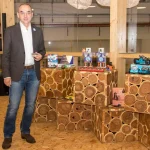Nenad Bakić’s project makes an important step forward.
After almost 30,000 micro:bits have been distributed so far, 17 new pallets have recently arrived in Croatia. In cooperation with the Ministry of Science and Education and CARNet, the microcontrollers will be distributed to all sixth-grade students in 85 percent of schools which have voluntarily applied for this important project, reports Lider on November 24, 2017.
The project introduces computer programming into the sixth grades of elementary schools, but not just as “computer science” classes, but as an interdisciplinary activity for creativity development through new technologies, said project manager Nenad Bakić, a prominent Croatian businessman and philanthropist who launched the whole project.
At the A2B warehouse in Zagreb, Bakić welcomed the latest delivery and presented the details of the project. He also took part in the packaging of micro:bits which represent a historic watershed for Croatian education. Nearly 38,000 sixth grade students will soon use the micro:bits in school, and also carry them home to create the creative environment.
Speaking with reporters, Bakić said that “we should not just have to wait for system reforms, we have to offer the right thing ourselves,” alluding to the education system reform which has not yet been implemented. “The goal is to free up creativity and introduce technology. We should make a nation of digital creators. This is not just for regular computer science classes, but this is a project of enabling digital literacy for everyone,” Bakić said.
Minister of Science and Education Blaženka Divjak agreed. She attended the event and helped package the micro:bits. “This is a completely new way of teaching which allows multidisciplinarity. Students are given one valuable tool for learning multiple subjects. Teachers have approached this project very seriously, and I hope they will pass their enthusiasm to students. That is why the Ministry is involved,” said Divjak, confirming that micro:bits will be used for as many as eight subjects, at least for now. Nature, German language, technical education, computer science, mathematics, music, physics and Croatian language are subjects whose teachers are already being taught how to use micro:bits in classes.
The Ministry has allocated 4.7 million kunas for the purchase of micro:bits and Minister Divjak is confident that the impact of the project will be felt much broader than just in schools. The potential of the project has already been demonstrated through the cooperation of schools with the Ruđer Bošković Institute, and also with companies like Privredna Banka Zagreb. The use of the devices is promoted by the Micro:Bit Foundation, which is a non-profit organisation that enables children across the globe to be creative using technology and digital skills at school, at clubs and home.
Micro:bits are used in schools all over the world, from Finland and Iceland to Singapore and Sri Lanka. Young IT developers have demonstrated what the small devices can do and be – from temperature and light sensors to motion sensors (acceleration sensor and compass).
That ideology should be sidelined in projects such as this was demonstrated by Minister Divjak and leader of SDP, the biggest opposition party, Davor Bernardić. They both joined forces with Bakić to prepare the delivery which will allow students to experience better and more modern education.
Translated from Lider.
Nenad was kind enough to agree to a video interview in English with TCN earlier this week to give more information about the project, which you can see below.









